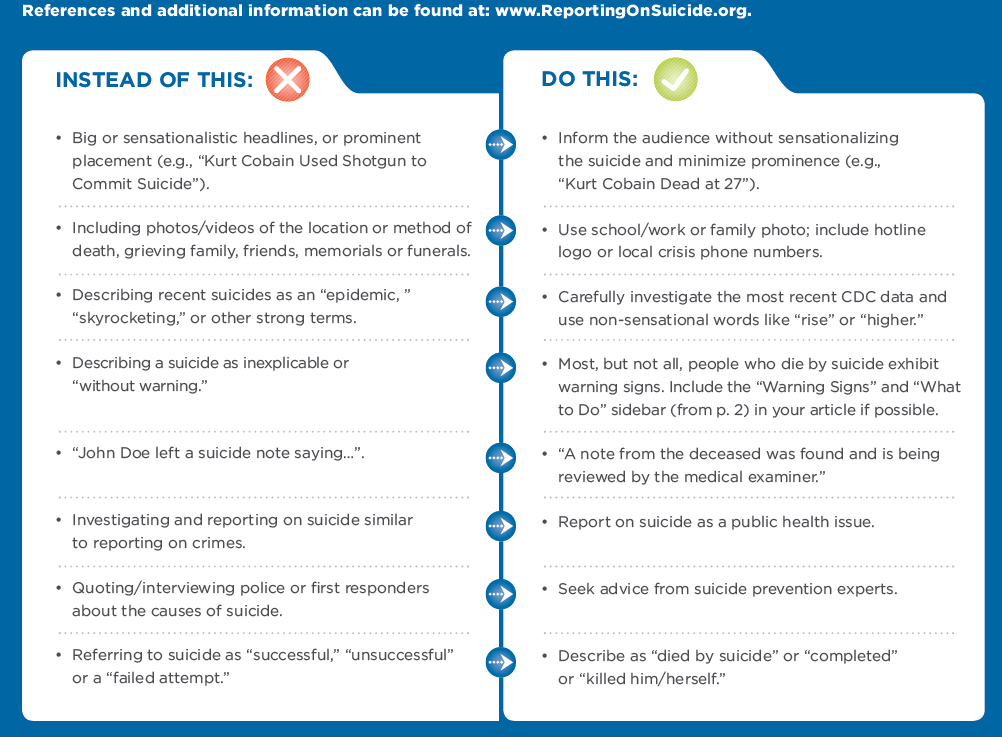NFL Hall of Famer Junior Seau committed suicide the other day. His death may be related to the concussion issue. It may not be. Whatever happened, media coverage of such celebrity tragedies really matters. Sensationalist or ill-informed coverage spreads myths. It can also foster dangerous behavioral contagion. Good coverage can increase public understanding of a complex issue. It can also point people in mental pain or at suicide risk towards sources of help.
A useful set of media guidelines is available here. The below snapshot of coverage “do’s and don’ts” is especially  useful. This is important.
useful. This is important.
What science is this based on? I’m particularly skeptical of the “warning signs” approach, as there is broad disagreement as to whether and what these alleged warning signs are. Also, portraying it as preventable puts all the more (unwarranted) guilt on survivors. Encouraging people to overreact to any alleged “suicide warning sign” makes it even harder for suffering folks to talk about it.
Got to agree with sister Y here. I’ve looked at a lot of the data and the one thing that seems to come through loud and clear is that many of the “interventions” backfire - that is, the rate goes up when the “pros” get involved.
I’ll have a closer look. My own interest is more in the “don’t” column of media practices that promote contagion. There’s a growing literature on that.
I happened to have MSNBC on when I read this at lunch today (I usually have the news on at lunch, but I’m not sure it helps my digestion). They were covering the Seau story — and they violated at least four of your don’ts. Sad.
Why is it the media’s job to worry about promoting contagion? It seems to me the media’s job is to sell content, and the media has a First Amendment right to do so how ever it wishes (including by sensationalizing suicide).
I doubt that the media actually affects the suicide rate one way or the other. 99 percent of the time, would-be censors grossly overstate the effectiveness of expression in the media. But even if it does, that doesn’t make the media RESPONSIBLE for the suicide rate. The people responsible for the suicide rate are those who commit suicide (something they have the right to do by the way- I don’t see any reason the optimal suicide rate is anywhere zero anyway). If you want to reduce the rate, leave the media alone and try to persuade those considering the act. Or even better, don’t, and let them have the freedom to end their lives.
The Boston Globe ran a front-page picture this morning of Seau’s grief-stricken mother.
They should not have done that. Period.
Care to elaborate? For the slow among us?
Sure.
The photo showed her very distraught, as we might expect. My opinion is that she is entitled to some privacy at what is surely one of the worst times of her life.
Maybe you’re right but it’s not intuitive or obvious to me. I guess this is why we need meta-ethics.
I don’t see the photo on The Globe website.
But if you google the video of Junior Seau’s mother, you’ll see her addressing the press and the public for about two painful, heart-wrenching, can’t-stop-watching minutes.
It’s my strong impression that she is not the slightest bit concerned with her privacy now being obviously consumed by overwhelming grief.
Incidentally-but perhaps not irrelevantly-I think that two-minute address, which is really hard to understand at the end, is the most effective anti-suicide “argument” that I can possibly imagine.
It was in the paper paper.
Maybe she doesn’t care about her privacy and it’s not a big deal to her. I don’t know. I suspect the Globe didn’t know either.
Still, some people in that situation do care.
“Completed”? A new one to me. It’s so PC as to be incomprehensible.
Given the ease with which nouns are verbed in English (google, hoover, bus ….) why hasn’t “suicide” become a verb?
“suicided” is indeed a verb, in some circles, though not in the sense you suggest.
It can mean the murder of a detainee or an assassination where the official explanation is scuicide.
Good point. But that’s transitive. “Disappear” has both the normal, intransitive sense and the ironical transitive one:
- Radical activist Juan Gonzalez disappeared in the summer of 1972. (Nobody knows whether he’s alive or dead).
- We think that radical activist Juan Gonzalez was disappeared in the summer of 1972. (The secret police killed him.)
But:
We think that Juan was suicided (or, was “suicided”) in prison. (The prison guards killed him).
* Juan suicided in prison. (Intended meaning, he killed himself; unacceptable usage).
I had to look it up to be sure, but dictionaries do list “to suicide” as an intransitive verb with the meaning of “to commit suicide”? With examples of usage going back a century or so?
Memo to self: check with ancient microprint OED before sounding off on usage from the standpoint of “everybody knows.”
In sel-defence, the intransitive usage is rare, which is odd given the frequnncy of suicide itself.
Just saw a story that none of Seau’s friends saw warning signs.
Also, not all studies find the “Young Werther” effect (suicide contagion) exists, and some even find the opposite - that exposure to suicide stories in the media is protective against suicides, e.g. “Is Suicide Contagious? A Study of the Relation between Exposure to the Suicidal Behavior of Others and Nearly Lethal Suicide Attempts.” Hardly enough evidence to justify the kind of censorship that is widely advocated without question.